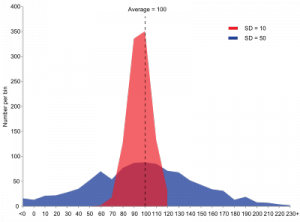 Slot machines are among the riskiest games in the casino. Slots variance is at the core of why these games are so difficult to predict.
Slot machines are among the riskiest games in the casino. Slots variance is at the core of why these games are so difficult to predict.
But what exactly does variance mean?
I’m going to cover this term in depth along with how you can apply it to your slots sessions.
What Does Variance Mean?
Variance measures the difference in results as they relate to a statistical average. Simply put, it looks at how likely results are to end up somewhere around the mean.
How Does Variance Apply to Slot Machines?
If you’ve played slots before, you probably realize that the results can vary wildly.
 You may win hundreds of dollars one session, then lose money in the next 5-10 sessions. Compare this to baccarat, where you can expect to win at a more-even rate.
You may win hundreds of dollars one session, then lose money in the next 5-10 sessions. Compare this to baccarat, where you can expect to win at a more-even rate.
Slots are said to have high variance, because results differ so greatly from the average. A slot might offer 95% RTP, yet pay back anywhere from 40% to 160% for a single session.
Of course, you have no real idea on how much you’ll win back in a given session. But you can always expect a crazy range when studying your results.
How Slots Variance Compares to Volatility
Slots variance and volatility are often used interchangeably. They are pretty similar for the most part, especially in what they measure.
However, the key difference is that variance isn’t bound by time. It’s simply used to measure the difference in high and low results over a vague time frame.
Volatility, on the other hand, is bound by a specific time. If you’re looking at slots results over the course of one week, then you’re measuring volatility.
Keep in mind, though, that you’ll still see these terms used interchangeably. Just remember that volatility is bound to a specific time while variance can be for any time frame.
